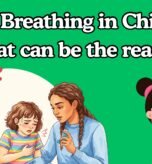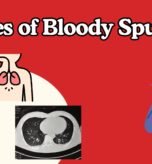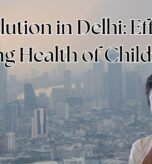Do you often wonder why your child has cough every month?
Are you tired of giving medications and nebulisations to your child for his cough?
Did you recently go to your child’s pediatrician and were told that your child may have asthma?
Are you upset that your child has a disease that may require long-term treatment?
All your worries are genuine though, the magnitude of stress they cause to you and your child may not be so genuine. To answer all these questions and to address few myths about childhood asthma, I request you to read on.
Myth number 1: Asthma is a disease of adults and chronic bronchitis is a disease of children
On the contrary, chronic bronchitis is a disease of the adults who have long-term irritation of the airway, leading to permanent changes in the respiratory tract. Asthma on the other hand can affect children as young as 1 year old.
Asthma is caused due to an allergic reaction affecting the respiratory airway in certain susceptible individuals that leads to repeated bronchospasm (termed congestion in layman terms) which is reversed by giving bronchodilators (nebulisations with Salbutamol or levosalbutamol). These airways become hyper-responsive to the inciting stimulus which may be any allergen (dust, pollens, moulds, pets, insects), infections (viral or bacterial), exercise or emotional instability. As a result, children present with repeated cough or breathlessness, wheezing or chest tightness on repeated exposure to these offending factors.
It is obvious that all these factors that stimulate asthma can be present in individuals of all age groups, including children.
Myth number 2 : Children outgrow asthma with time
It cannot be said with certainty if a child diagnosed to be an asthmatic will continue to have symptoms, or need medications for life. Anyone who has asthma once in life, will have that susceptibility to have flare-ups throughout their lives. However, their symptoms and the reactivity of the airway can be controlled by giving regular treatment and avoidance of the stimulus as far as possible.
Around 50% of children with asthma who take proper treatment become symptom free by teenage years, however they can still have recurrence of symptoms in adulthood. Adherence to inhalers in childhood may help in prolonging asthma control in adulthood.
Myth number 3: Asthmatics cannot play or engage in activities in school
There are no restrictions imposed by asthma on any child. Apart from avoidance of dust, smoke and smell, which should be done by non-asthmatics also, no restrictions or precautions need to be taken by individuals with asthma.
It is true that exercise or increased physical activity can induce flare-ups or acute symptoms in these children, hence, the aim of asthma medication is to achieve normalcy in day-to-day activities. The dose of inhaled steroids is escalated to a level such that there is no limitation of activity. When such control is achieved, same dose is given for 3-6 months, till the pulmonologist sees it fit to taper dose and eventually discontinue medicines.
With proper avoidance measures of environmental triggers and good adherence to therapy, children can lead a normal life.
Myth number 4: Asthma symptoms come back by eating banana, rice or curd
Food allergies can sometimes cause symptoms of asthma though, it is very uncommon (around 1-10%). Foods known to cause allergies are peanuts, wheat, cow’s milk while banana, rice and curd stand way down in the list of possible food allergens.
Also, as per the allergic march concept, food allergies are prevalent in infancy and toddler age group and majority grow out of this allergy. Older children seldom have food allergies causing respiratory symptoms.
Restricting essential and readily available food items from a child’s diet, without any hard evidence may lead to nutritional deficiencies and poor cognition instead of asthma.
Myth number 5: Asthma medications should be given during flare ups only
While asthma medications are increased during flare-ups, they need to be continued for longer periods when there are no symptoms.
Asthma flare-ups are acute attacks when a child has cough and wheezing causing severe breathing difficulty. The airway at this time are narrow due to bronchospasm which needs to be relieved with bronchodilators (RELIEVER MEDICINES- salbutamol, levosalbutamol, ipratropium). Other asthma medicines (CONTROLLER MEDICINES- inhaled steroids) are the mainstay of asthma control. These are preventers that reduce the number of events where reliever medicines may be required. Therefore, not all but some inhalers need to be given continuously for long durations despite being symptom-free.
Myth number 6: No one dies of asthma
Asthma flare-ups can sometime be severe enough to be fatal. However, with newer treatments and increased awareness, the death rates have come down.
All children with asthma are prone to have flare ups which can be managed successfully at home. Poor adherence to medications and delayed recognition of early ominous symptoms can lead to severe flare-ups that require hospitalisation and even ICU care. Asthma action plan which is given to parents of every child must be well-understood, to ensure timely reporting to hospital.
Myth number 7: Steroids are dangerous medicines associated with lots of side-effects and are habit forming
Asthma as a disease can be detrimental to growing children lungs in a big way. Poor asthma control (child has repeated episodes of cough and wheezing, multiple hospital visits) can cause permanent damage to child’s airways. To prevent this inhaled steroids are prescribed that act locally on the inflamed airways and play a major role in preventing asthma attacks.
The inhaled steroids prescribed by pulmonologists are different from the steroids consumed by athletes to enhance their performance. The inhaled steroids act on the area of concern (airways) with minimal systemic absorption. Now since the drug is not going into the blood, there is no reason to have too many side effects. If we compare the adverse effects of asthma with the likely adverse effects of asthma medications, giving the medications is a definitely better choice.
Aa lot of parents are concerned that by giving long term inhaled steroids, their child will get addicted to it. “aadat pad jaygi to” Inhaled steroids are not habit forming as their systemic absorption is negligible. If the drug is not going into the brain, how will the child form a habit?
Myth number 8: My child has asthma because I have asthma
Again, asthma is caused by a hyper-reaction of the airway to an allergen present in the environment, food item, drugs, exercise, emotional instability. Although asthma runs in families, it is not because of the parents that a child’s airway get inflamed. The child with asthma acquires this tendency to react to the triggers for his own asthma in his own lifetime.
Similarly, good asthma control and compliance in parents does not guarantee good asthma control in child.
Myth number 9: When there is so much pollution in the city, smoking does not make a difference
Indoor pollution is known to be a bigger culprit than outdoor pollution in asthma. Passive smoking exposure is a single important risk factor for poor asthma control and complications of asthma. Tar and tobacco can reach your child’s lungs from your clothes, hands, car seat covers, curtains, beddings etc. This can be extremely detrimental to child’s asthmatic lungs. All efforts should be made to prevent this ominous exposure at all costs.
Use of air purifiers, does not prevent asthma completely. It is a double edged sword. Air purifiers with HEPA filters, filter out the VOCs and PM from the air but they also remove the viruses and bacterias which are actually important for developing immunity in a growing child.
Myth number 10: Asthma will be cured if I move to another city
The environmental allergens responsible for asthma attacks in one city may not be present in another city. There is a chance that by moving to another city the flora and pollen exposure will change and the child might not have allergic reactions to that. But he will have an asthma attack every time he gets exposed to the causative allergen in the previous city. So asthma cannot be cured by changing city, it may be better controlled.
With modern medications and advancements in the field of allergic disorders, new treatment modalities like Immunotherapy can be offered to children. Immunotherapy maybe in future help in curing asthma.




